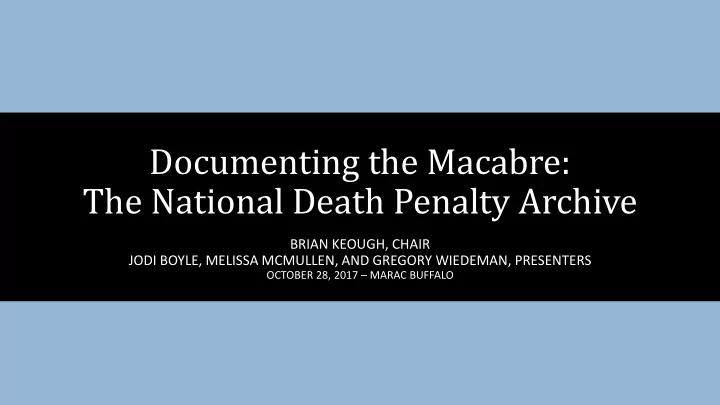

Documenting the Macabre: The National Death Penalty Archive BRIAN KEOUGH, CHAIR JODI BOYLE, MELISSA MCMULLEN, AND GREGORY WIEDEMAN, PRESENTERS OCTOBER 28, 2017 – MARAC BUFFALO
The Espy Project GREGORY WIEDEMAN UNIVERSITY AT ALBANY, SUNY
Project History CLIR Hidden Collections Processing Grant 2014-2016 XTF Access System User testing exposed limited systems Trouble demonstrating value and expanding use CLIR Digitization Grant 2017-2018 Potential for computational use Need for web application framework
M. Watt Espy Papers 33,000 sides of index cards Over 115,000 pages of reference materials Copies of Correctional Records Copies of newspapers and published sources Written notes
M. Watt Espy Papers
Computational Analysis and the Death Penalty Furman v. Georgia (1972) Gregg v. Georgia , etc. (1976) Marvin Wolfgang and Marc Riedel Study (1973) and Maxwell v. Bishop David Baldus-led Georgia Study McCleskey v. Kemp (1987) Found "racially disproportionate impact" Invalidated statistical analysis for 14 th amendment Batson v. Kentucky (1986) Miller-El v. Dretke (2005)
Executions in the U.S. 1608-2002: The Espy File University of Alabama project funded by NSF (1984) Found over 15,000 executions by the state since Colonial Jamestown Espy not confident in coding practices Blackman and McLaughlin, “The Espy File on American Executions: User Beware” Homicide Studies 15(3) (2011) Inter-University Consortium for Political and Social Research (ICPSR) They are nice
Digitization Process
Samvera Repository Rails web application framework Enables API Development Public access to Espy data Support automated born-digital workflows Connect with ArchivesSpace API MVC framework Data Modeling Solr indexing server Enables modern searching users are familiar with
Espy Metadata Creation Tool Rails application “Ramp up” plan for repository implementation and maintenance Makes connections between 4 difference sources Small Index Cards Large Index Cards Reference Material Espy File data from ICPSR Create new Espy Records backed by Data Model Make the computer do the boring work Focus on intellectual process of metadata creation
Metadata Decisions Espy File data demonstrated creators’ priorities, values, and mental framing that are inappropriate or conflict with our own Occupation: “Student” “Banana Dealer” “Beef Carrier” “Goat Herder” “ Tiecutter ” “Tourist”
Metadata Decisions Occupation: “Armed robber” “Asylum Escapee” “Bandit” “Criminal” “Cult Leader” “Drifter” “Gang Member” “Lunatic” “Male Nurse” “Retarded” “Slave”
Metadata Decisions Race White Black Native American Asian-Pacific Islander Hispanic Other Slave Compensation Case
Metadata Decisions “Crime Committed” - > “Crime Convicted” ISO dates Added Date of Conviction to Date of Execution First and last name in individual fields Altered Place of Execution and Jurisdiction Including more geographic information Sex to become Gender Feedback welcome!
Linked Data Samvera replaces ActiveRecord database with Fedora Commons Repository Fedora 4 stores native linked data Technical issue of caching URIs Using common, standardized vocabularies
Linked Data Crime Convicted Should we create our own vocabulary? Access to expertise Different mission
Documenting the Macabre: The National Death Penalty Archive BRIAN KEOUGH, CHAIR JODI BOYLE, MELISSA MCMULLEN, AND GREGORY WIEDEMAN, PRESENTERS OCTOBER 28, 2017 – MARAC BUFFALO
Recommend
More recommend